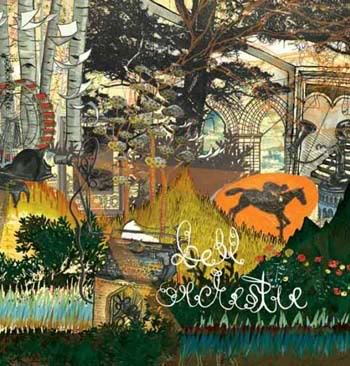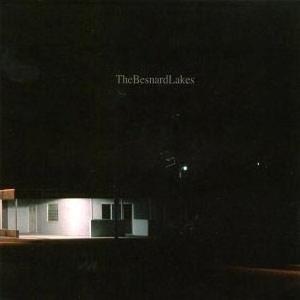
The first Besnard Lakes album, Volume 1 (2004) was recorded when the band were just a husband and wife team, Jace Lasek and Olga Goreas, who had used free time at the recording studio that they own and run to knock some of their own stuff together. It's a great record, ambitiously pre-empting a revival of unashamedly prog-influenced expansive rock. It still sounds a little bit as if there could have been more fleshing out of the overall sound and it's a disjointed record, but I think that's just because it was only the two of them trying to make this huge sound. Opening 9-minute behemoth 'Skyscraper Girls' really sets the template for all their records to come, sprawling, immersive, mid-tempo but weirdly propulsive (in fact that's one of their smartest tricks, the songs never sound plodding, yet they definitely plod) and absolutely massive. There's lots of guitar wrangling from David St Hubbins-alike lead man Lasek, and another unusual thing they pull off is to have his lead vocals generally higher than her backing which makes the vocal melodies strangely disconcerting but ultimately oddly pretty. Volume 1 does have a couple of songs that don't quite cut it but on the whole it's a grandstanding declaration.

Second album, The Besnard Lakes Are the Dark Horse (2007) fleshes out the sound hugely, making the album a much more consistent and impressive record. The prog elements are brought further to the fore, with washes of muddy sound in the background to highlight the pristine guitar and vocal work to the fore and the songs are stately and towering, some taking a while to build up to their dramatic heights, but always showing off in the end. Unsurprisingly perhaps there are instrumental appearances from members of various other Canadian art-indie acts (Stars, Godspeed!). As an album the only problem with The Dark Horse is that it doesn't necessarily grip you all the way through and on occasion you might find your mind wandering slightly. Which is not a problem with 2010's The Besnard Lakes Are the Roaring Night, which is a truly spectacular album, probably the perfect distillation of the prog renaissance as filtered through an indie sensibility and a record collection the size of a planet. There are references to everything that's ever happened in American rock music in this album and none of them even matter because the songs themselves are absolutely brilliant. Some people have suggested that it's a kind of post-shoegaze approach to record making but I think that's way wide of the mark - this is simply blistering rock music that has a much more self-effacing way of presenting itself than the usual hollow showmanship of rock. Lasek has apparently said that the songs are psychedelic rock-"each song is its own little world, an atmosphere. I’ve always been enamored with these songs that take forever to get going, long songs that build, with a story and a long build to a climax." There's no denying that that's how most of the songs on The Roaring Night are constructed, they wash in and out, each surge coming further up the shore until they build up into a giant rolling wave. Silly analogy, but you get what I mean. Anyway, it's really great stuff and easily one of the best albums of 2010.


And so, definitely finishing off the letter B we have the collaboration between Broadcast and the Focus Group, Investigates Witch Cults of the Radio Age (2009). I like the Broadcast albums and think that they did some interesting stuff along the way but to be honest I never really understood why people get quite so hot under the collar about them. In the end I would rather listen to the United States of America album that they ripped off than their own versions of it. There's nothing wrong with them, far from it, but they just don't quite get me. Broadcast and the Focus Group Investigates Witch Cults of the Radio Age is a slightly different affair to the usual Broadcast output. It's influence is more clearly from 1960's European soundtracks (the rightly ubiquitous Lubos Fiser's work on Valerie and Her Week of Wonders has inspired more of this sort of stuff than Fiser would ever have been able to dream I suspect) and as a result is a more piecemeal sequence of distracted melodies and complicated instrumentation, all atmosphere over substance, and that's the real problem with the album - it's basically quite boring. Instead of representing a kind of radical reinterpretation of freak-out for a new age it just seems to be aping stuff from the early-70's underground and assuming that'll do. It's alright, but if I need to hear this sort of stuff I'll just watch Morgiana and let Fiser remind me how it's really done.

And so that does indeed mark the end of our odyssey through the letter B. What's it been, 62 days to get to C? This nonsense is never going to end is it? Cripes. Anyway, on we march, into the complicated landscape of C, which commences with the king of ultra laid-back middle-brow blues for the discerning white man, J.J. Cale. That sounds horribly dismissive but I don't really mean to be, because although his audience was pretty specific back in the day, he deserved better than to be seen as a kind of MOR blues journeyman. Debut album Naturally (1972) is a great bit of reinterpretive blues work, and Cale's husky vocal delivery helps create the sultry crepuscular atmosphere of the whole thing. It would be unfair to call this blues-rock mostly because one thing it most assuredly does not do is rock - instead Cale is intent on creating an atmosphere that allows you to wallow in the smoky, rolling, barely-there sound. It's either the distant soundtrack to a great long, late night in a heathazed bar or else to a warm evening sat back in a big chair with a good whisky and the sounds of the neighbourhood through the window. 1979's 5 is pretty much more of the same. Cale had been perfecting his style over the years, making it smoother and smoother and although 5 is a highly accomplished bit of work, it does lack the kind of making it up as you go along, rough edged feel of Naturally and the production makes the whole thing feel almost too slick. There are still some great songs on here and for the most part it's another charming bit of idiosyncratic blues.


No comments:
Post a Comment